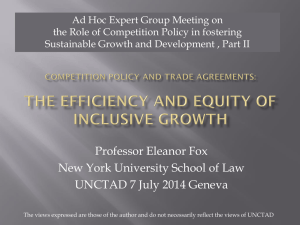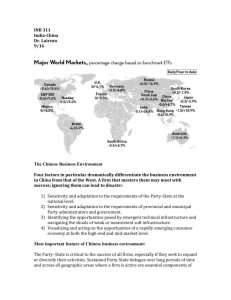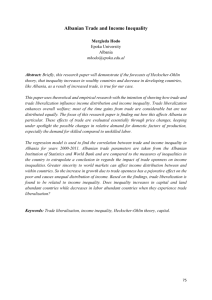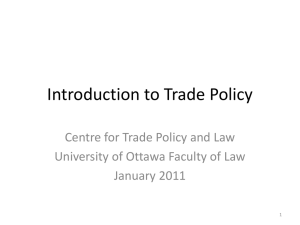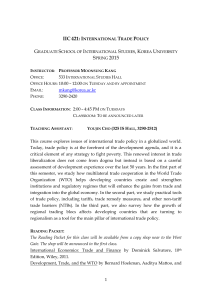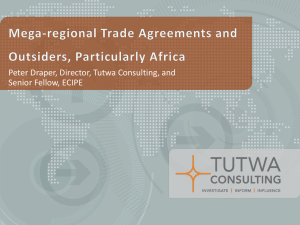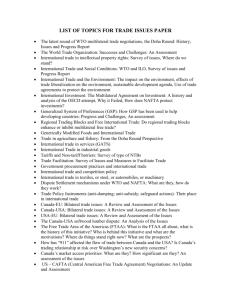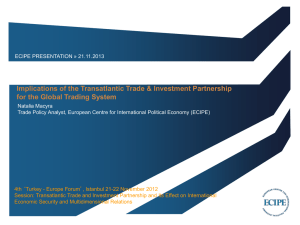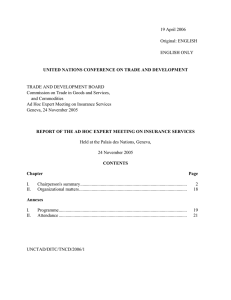The relation between investment and competition policy
advertisement
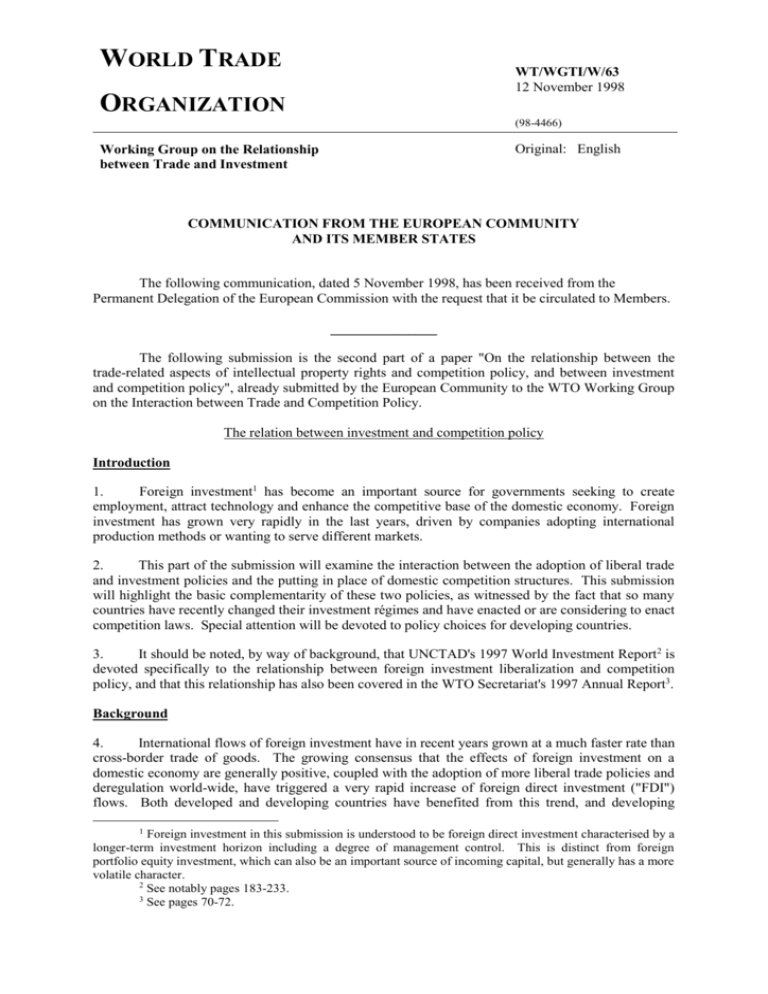
WORLD TRADE WT/WGTI/W/63 12 November 1998 ORGANIZATION (98-4466) Original: English Working Group on the Relationship between Trade and Investment COMMUNICATION FROM THE EUROPEAN COMMUNITY AND ITS MEMBER STATES The following communication, dated 5 November 1998, has been received from the Permanent Delegation of the European Commission with the request that it be circulated to Members. _______________ The following submission is the second part of a paper "On the relationship between the trade-related aspects of intellectual property rights and competition policy, and between investment and competition policy", already submitted by the European Community to the WTO Working Group on the Interaction between Trade and Competition Policy. The relation between investment and competition policy Introduction 1. Foreign investment1 has become an important source for governments seeking to create employment, attract technology and enhance the competitive base of the domestic economy. Foreign investment has grown very rapidly in the last years, driven by companies adopting international production methods or wanting to serve different markets. 2. This part of the submission will examine the interaction between the adoption of liberal trade and investment policies and the putting in place of domestic competition structures. This submission will highlight the basic complementarity of these two policies, as witnessed by the fact that so many countries have recently changed their investment régimes and have enacted or are considering to enact competition laws. Special attention will be devoted to policy choices for developing countries. 3. It should be noted, by way of background, that UNCTAD's 1997 World Investment Report2 is devoted specifically to the relationship between foreign investment liberalization and competition policy, and that this relationship has also been covered in the WTO Secretariat's 1997 Annual Report3. Background 4. International flows of foreign investment have in recent years grown at a much faster rate than cross-border trade of goods. The growing consensus that the effects of foreign investment on a domestic economy are generally positive, coupled with the adoption of more liberal trade policies and deregulation world-wide, have triggered a very rapid increase of foreign direct investment ("FDI") flows. Both developed and developing countries have benefited from this trend, and developing 1 Foreign investment in this submission is understood to be foreign direct investment characterised by a longer-term investment horizon including a degree of management control. This is distinct from foreign portfolio equity investment, which can also be an important source of incoming capital, but generally has a more volatile character. 2 See notably pages 183-233. 3 See pages 70-72. WT/WGTI/W/63 Page 2 countries are now host to about 40 per cent of incoming investment, while their share of outflows is around 15 per cent. Overall the liberalization of investment opportunities, whether its origin is foreign or domestic, is seen as central to the increase of competition and growth of economies. 5. It is generally recognized today that regulatory policy, trade policy, FDI policy and competition policy are at the centre of choices of governments seeking to enhance national growth and welfare by improving the allocation of resources and contestability of markets. It is also increasingly confirmed that consistency and coherence between these policies is important, all the more so in view of the fact that in many countries trade liberalization, FDI liberalization, domestic deregulation and the introduction or reinforcement of compeition policies are taking place simultaneously. Domestic competition structures are complementary to liberal trade and investment policies 6. A key question for many countries applying more liberal trade and investment policies, or in the process of deregulation, is to what extent these policies need to be supported by the adoption of competition policy structures. This question is notably poignant for developing countries, since competition policy may require additional resources to set up new administrative capacity and structures. 7. The main arguments that are put forward to support the establishment of domestic competition structures can be summed up as follows: 8. Firstly, there are sectors in the economy of every country that may remain, to a degree, unaffected by trade and investment liberalization, such as for example services that are not traded internationally and may depend on national qualifications. For these sectors competition policy can be a good instrument at hand to guarantee effective competition so that benefits of policy reforms accrue to consumers. 9. Secondly, the deregulation and privatisation policies that are being pursued in many countries are often far-reaching, ranging from telecommunications, energy and postal services to airlines and other forms of transport. The success of these policies, as well as their acceptance by the public at large, will depend on the ability of governments to inject and uphold sound competition once the market has been liberalized, including through the application of competition law and pro-competitive regulatory régimes. 10. It is interesting to note that the European Community's member States have also strengthened their competition policies individually. An example, among many, is the Netherlands, which has a relatively small domestic market compared to the EU as a whole and a great openness to foreign trade and investment, yet has in the last few years chosen to change its basic competition law and to strengthen the independence, administrative capacity and instruments of the competition law enforcer4. 11. Thirdly, a legal and administrative framework to guarantee sound competition can help set proper conditions for a successful implementation of liberal trade and investment policies. A key element in the overall policy debate is that foreign companies, when considering investment options in different markets, will place a high premium on the country that has the most developed legal system in terms of allowing access and protection of the investment, reducing administrative burdens and addressing distortions of the competitive process. A stable framework of competition rules will attract foreign investment by strengthening the regulatory fabric of the economy and confidence in the stability of policy. 4 Of course, EC competition law applies to all practices in the Community as soon as trade between member States may be affected. WT/WGTI/W/63 Page 3 12. The change in the investment régimes of many countries has been driven by the recognition that an ex ante screening of foreign investment through centralised application procedures, often including onerous pre-establishment requirements or targeted priority sectors, may in fact lead to significant welfare costs, deter the transfer of technology and discourage foreign investment generally. Nowadays, in many different countries, governments may even seek to encourage investment through policies such as the granting of tailor-made fiscal or other benefits, or through the application of trade restrictions such as higher tariffs, to shield the new investor from competition through imports. 13. While the above bears witness to the policy changes that have been adopted more or less widely, many countries, including developing ones, may remain concerned that investment liberalization could lead to unfair competition or monopolisation by capital-intensive foreign companies seeking to enter the market. In all such cases, antitrust agencies can perform an important task to protect consumers and competitors against anticompetitive practices. 14. It should be noted that no clear correlation has been found to exist between a liberalization of foreign investment by developing countries and an increase of concentration in their markets. Moreover, as the object of competition laws is to benefit consumers and uphold the competitive process of a national economy irrespective of the origin of a producer or service provider, their application may, of course, also work the other way. It could, for example, affect incumbent firms if these should seek to form a cartel or resort to other anticompetitive behaviour to keep out a foreign entrant. It is therefore essential that competition laws are neutral in their application, so that anticompetitive practices can be addressed regardless of whether they are undertaken by domestic or foreign companies. Procedural aspects of competition laws, such as the provisions relating to access to national courts, the imposition of remedies, appeal procedures, transparency and motivation requirements, should also in general be neutral and not in any way differentiate between domestic or foreign producers. 15. Fourthly, competition policy can be an essential complement to investment liberalization in other respects too. Investment, both foreign and domestic, can take a number of forms, such as through a greenfield investment or through a merger or acquisition. The effect on competition may be different in each case: while a greenfield investment will generally increase the number of competitors, in case of a merger or acquisition efficiency advantages may have to be weighed against a reduction in the number of suppliers or the strengthening of a dominant position. Here again the advantages of case-by-case supervision by a well-functioning competition authority, and of the ex ante control provided by merger pre-notification legislation, may be invaluable to support healthy competition in the economy. 16. Overall, when liberal investment and trade policies are combined with an effective competition policy and are pursued together, this is likely to increase the positive effects of investments including foreign investment, and to lead to improved levels of competitiveness both in the domestic market and in the ability of companies to compete on international markets. WT/WGTI/W/63 Page 4 Costs and benefits of competition laws 17. The application of competition policy requires a complex assessment of business practices in dynamic markets, as well as the use of investigative powers, and therefore necessitates a qualified staff and a proper administrative and judicial capacity. Yet despite these costs, over seventy countries have adopted competition laws, many of which have also been strengthened in the past decade in terms of stricter and broader rules and higher penalties. Many other countries are also in the process of elaborating such laws or considering their adoption. It is, therefore, fair to say that it is increasingly accepted that a well-functioning competition agency is the appropriate vehicle to replace heavy ex ante administrative procedures to vet foreign investment and other establishment requirements5, while it also confers related advantages such as facilitating further deregulation of the economy. Moreover, because competition policy takes a case-by-case and an almost surgical approach to protect the competitive process, it is likely to turn out to be an efficient and cost-effective instrument. In general, it may also enable a decrease of bureaucracy in the government as a whole. Lastly, much enforcement of competition laws is also realised by private parties before civil courts, and would not require the involvement of governmental agencies. The international dimension of investment and competition policies 18. It is interesting to note that as the GATT has evolved into the WTO, the trading system now includes an increasing number of rules on either investment or competition protection. The most important mode of delivery in services trade, for example, is generally foreign investment through commercial presence. An access commitment negotiated accepted in a services negotiation thereby creates a right to invest through establishment in that country. Moreover, the GATS Agreement 6 on trade in services provides that WTO Members shall ensure in all sectors where commitments are taken, including on investment through commercial presence, that a supplier in that sector does not abuse its monopoly position or act in a manner inconsistent with those commitments. Furthermore, during the recent telecommunications negotiations, it was recognized that commercial presence commitments needed to be strengthened by competitive safeguard provisions to protect competition between providers and to ensure competitive and non-discriminatory access to fixed networks. More than 55 countries agreed to guarantee such procompetitive regulatory principles through adoption of the so-called reference paper. 19. As a response to the growth of FDI more and more countries have come to conclude bilateral investment protection agreements. There are today about 1,600 bilateral investment protection agreements, where there were about 600 in the early nineties. 20. Similarly, the last few years have seen an increase in the number of bilateral and regional agreements containing provisions on cooperation in the field of competition policy. It is true that the latter can differ in scope and depth, depending on the development of domestic competition structures. An increasing number of countries, however, have come to recognize the benefits of closer international cooperation. 5 Many countries have started streamlining their foreign investment laws and phasing out preestablishment requirements such as those relating to the product range or production capacity of a potential investment, to minimum local content, export performance, foreign exchange balancing and technology transfer requirements, as well as to maximum foreign equity caps in specific sectors. It should be noted that effective screening procedures also require considerable administrative resources, which would be freed by this streamlining process. 6 Article VIII GATS. WT/WGTI/W/63 Page 5 Summary and conclusions 1. This submission, which should be seen together with previous submissions by the European Community and its member States, draws particular attention to the following issues: 2. There is a basic complementarity between the liberalization of trade and investment régimes, the protection of intellectual property rights and an active policy of competition law enforcement. Many WTO members, including in particular developing countries, have undertaken economic reforms in all these areas, as a means of promoting growth and efficiency and enhancing the capacity of domestic firms to compete in international markets. These reforms have also implied moving away from administratively burdensome and inefficient methods of ex ante screening of foreign investment. A stable, non-discriminatory and transparent legal framework for business, of which competition law is an essential component, is increasingly seen as essential for attracting investment, ensuring the benefits of trade liberalization, as well as to address anticompetitive practices. 3. The benefits for growth and development of liberalization of foreign investment régimes are generally recognized. Many WTO members, including in particular developing countries, have seen the advantages of proceeding in parallel with a liberalization of rules concerning foreign investment and a reinforcement of competition law structures. A transparent and non-discriminatory competition law framework provides the means to address anticompetitive practices, regardless of whether these are undertaken by domestic or foreign firms. This function can be best exercised by a competition authority with sufficient powers of investigation and enforcement in relation to anticompetitive agreements or abuses of a dominant position, as well as through the ex ante control provided by merger pre-notification legislation. As already noted, in setting out such an authority and enhancing their enforcement capacity, developing countries would require international assistance and cooperation. 4. These trends underscore that investment and competition policies, while distinct and separate, have an increasing international dimension and would both benefit from enhanced multilateral cooperation. Open investment policies and active competition policy enforcement complement each other and contribute to enhanced efficiency growth and development. 5. The WTO Singapore Declaration established two Working Groups to examine the relationship between trade and investment and the interaction between trade and competition policy. The European Community and its member States believe that there is a case to consider the development of a multilateral framework in each of these areas. In our view, multilateral rules would contribute towards enhanced coherence, predictability and convergence, as well as reinforce the multilateral trading system. __________
